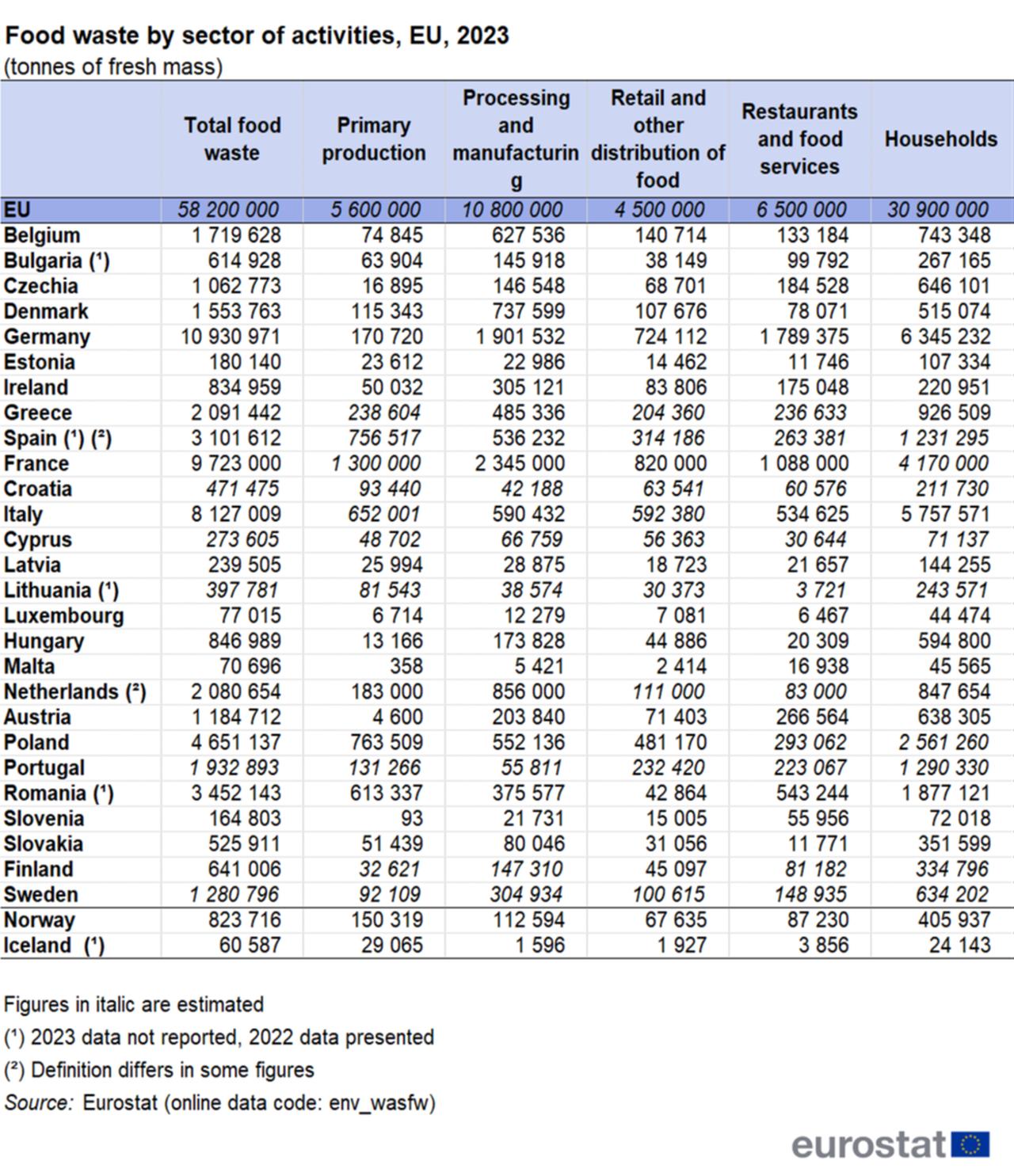
Europe generated 58.2 million tonnes of food waste last year, with households responsible for more than half, according to Eurostat data.
Greece ranked as the third-worst country in the European Union, with each resident wasting an average of 201 kilograms of food in 2023, behind only Cyprus (286 kilograms) and Denmark (261 kilograms).
Eurostat reported that 130 kilograms of food were wasted per person in the EU in 2023, marking a 0.7% increase from 2022.
This amounts to 58.2 million tonnes of food, including both edible and inedible parts. More than half of this total came from households, which threw away 69 kilograms per person, while the rest came from production, processing, retail, and restaurants.
The European Commission’s new directive on food waste (1892/2025), which came into effect on Oct. 16, sets legally binding targets for 2030.
Member states are required to cut food waste by 10% in processing and manufacturing and by 30% per capita in retail and consumption, including households and food services.

According to Eurostat, Greece discarded 2.09 million tonnes of food in 2023, equivalent to 201 kilograms per inhabitant. This marks an increase from 196 kilograms in 2022 and 191 kilograms in 2020.
Households were the main source of waste, accounting for the 44.3% of the total. The remaining waste came from processing and manufacturing, primary production, restaurants and catering , and retail and distribution.
By comparison, the EU average is 130 kilograms per person, while countries such as Spain (65 kilograms), Slovenia (78 kilograms), and Hungary (88 kilograms) perform far better.
Food waste in Greece (2023):

Dimitris Nentas, general director of Greece’s Food Bank, said that although households in Greece waste less food compared to the European average, economic hardship plays a key role in that trend.
“Inflation and the overall cost of living have forced people to be more cautious,” he explained to Kathimerini. “We see more people asking to take home leftovers or cooking less when they host gatherings. Awareness is growing, but we still have a long way to go. We are not yet environmentally sensitive enough, especially on this issue.”
Nentas also pointed out that Greece lacks financial incentives or penalties to encourage responsible food management. “In Italy, companies that donate surplus food receive tax reductions. In Greece, there are neither tax incentives nor deterrents like landfill fees,” he said.
EU campaigners push for stronger national action
Ntia Chorafa, coordinator of the Alliance for the Reduction of Food Waste in Greece, told Kathimerini that food waste remains a Europe-wide challenge.
“Progress has not been as fast as we hoped,” she said, adding that new measures will be adopted to meet the 2030 goals.
Chorafa emphasized the importance of education and public engagement. “We visit schools every day and run awareness campaigns. There has been improvement, but much more needs to be done for households to make food waste prevention a habit.”

The Hellenic Statistical Authority (ELSTAT) reports that 7% of Greeks face moderate or severe food insecurity, highlighting the stark contrast between waste and scarcity.
Experts argue that cutting food waste could not only ease environmental pressures but also support social welfare systems and food redistribution programs.
Across Europe, households remain the main contributors to waste, followed by the food manufacturing sector, restaurants, and primary production.
Without stronger national policies, experts warn that both Greece and the wider EU risk missing the 2030 reduction targets.